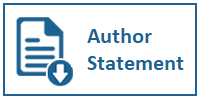THE EFFECT OF FISCAL COMPETENCE, TAX SOCIALIZATION AND TAX JUSTICE ON TAXPAYER COMPLIANCE
DOI:
https://doi.org/10.31937/akuntansi.v17i1.4245Abstract
Abstract— The tax ratio in Indonesia refers to the comparison between tax revenues and a country's Gross Domestic Product (GDP), indicating the size of the tax portion of the national economy. In recent years, Indonesia's tax ratio has tended to stagnate. The development of Indonesia's Tax Ratio in 2021 was 9.1%, in 2022 was 10.4%, in 2023 was 10.21% and in 2024 was 10.31%, lower than in 2023. This study aims to find empirical evidence of the influence of tax competence, tax socialization and tax fairness on taxpayer compliance. The sample selection technique in this study uses convenience sampling. Data processing using the Smart PLS program. The results of this study provide empirical evidence that tax competence and tax justice have no influence on taxpayer compliance, while tax socialization has an influence on taxpayer compliance. The implications of this research, tax officials can no longer act oppressively or arbitrarily against taxpayers. The digitalization of the tax system allows taxpayers to better understand and fulfill their tax obligations. The tax authorities' competence is no longer dominant, as taxpayers are given greater access compared to the old tax system. Through continuous tax outreach and easy access to tax information, taxpayers can access tax information via various platforms, which provides a sense of trust for taxpayers. Although there is a perception of injustice that triggers psychological impacts, such as dissatisfaction or an inability to see the correlation between tax payments and benefits received. Tax money is not used to save government companies, where there is a lot of mega-corruption that hurts the public as taxpayers.
Keywords: Taxpayer Compliance, Tax Competence, Tax Socialization, Tax Justice
Downloads
Downloads
Published
How to Cite
Issue
Section
License
Copyright (c) 2025 Andreas Bambang Daryatno, Linda Santioso

This work is licensed under a Creative Commons Attribution-ShareAlike 4.0 International License.
Authors retain copyright and grant the journal right of first publication with the work simultaneously licensed under a Creative Commons Attribution-ShareAlike International License (CC-BY-SA 4.0) that allows others to share the work with an acknowledgement of the work's authorship and initial publication in this journal.
Authors are able to enter into separate, additional contractual arrangements for the non-exclusive distribution of the journal's published version of the work (e.g., post it to an institutional repository or publish it in a book), with an acknowledgement of its initial publication in this journal.
















